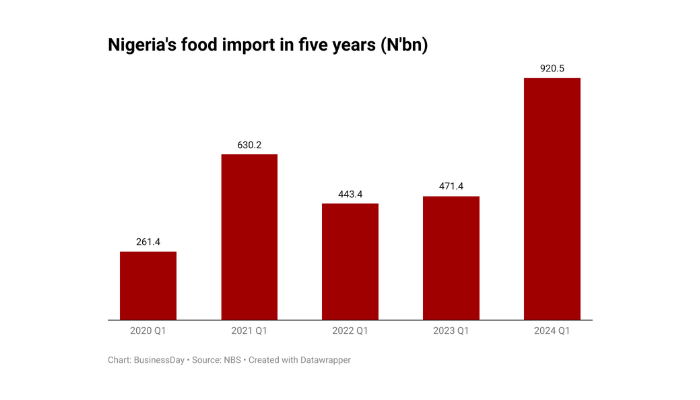Nigeria’s food import bill hit its highest level in five years during the first quarter of 2024, despite the country declaring a state of emergency on food production, data from the National Bureau of Statistics (NBS) shows.
From January to March 2024, money spent on food imports in Africa’s most populous nation surged 95.28 percent to N920.54 billion, compared to N471.39 billion in the same period of 2023.
In March 2024, in an effort to curb the worsening food crisis, President Bola Ahmed Tinubu emphasized that Nigeria would not rely on food importation to stabilize prices. Instead, he asserted that the government would focus on transforming scarcity into abundance domestically.
Despite these efforts, the country’s food inflation soared to a record high of 40.5 percent in April, a 15.92 percent year-on-year increase, leaving many people unable to afford a balanced diet.
The NBS Foreign Trade Statistics report shows that the value of food imports through maritime, air, and land surged 29.4 percent from N711.4 billion in Q4 2023.
“The major agricultural goods imported in Q1 2024 included durum wheat (not in seeds) from Canada at N130.26 billion and Lithuania at N98.63 billion,” the NBS reported. It added that frozen blue whitings meat from the Netherlands was valued at N16.67 billion. The combined value of wheat importation during this period was N519.75 billion.
The average cost of Nigeria’s wheat imports—a major driver of the food import value—increased 33 percent compared to its value in the previous quarter (N391.01 billion).
Nigeria continues to increase its wheat imports as wheat-based products remain popular among consumers amid rising prices of substitutes like garri and rice.
Total imports for Q1 2024 stood at N12.64 trillion, representing a 39.65 percent increase from N9.05 trillion in Q4 2023 and a 95.53 percent rise from N6.47 trillion in Q1 2023. Food imports accounted for 7.3 percent of total imports in the quarter.
By region, Nigeria imported goods primarily from Asia, China, Europe, America, and Africa. “The top-ranked import group was mineral fuels at N4,436.59 billion, representing 35.09 percent of total imports. This was followed by machinery and transport equipment at N3,170.35 billion (25.08 percent) and chemicals & related products at N1,786.43 billion (14.13 percent),” according to the NBS report.





